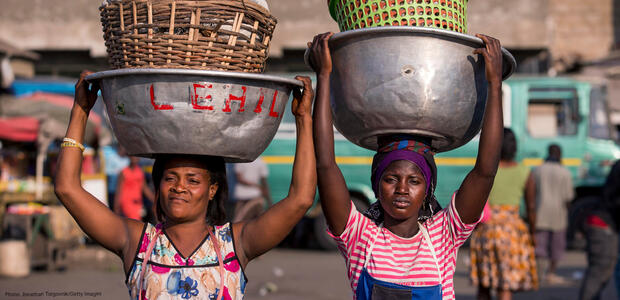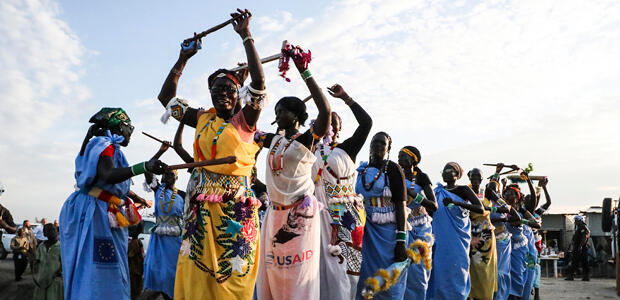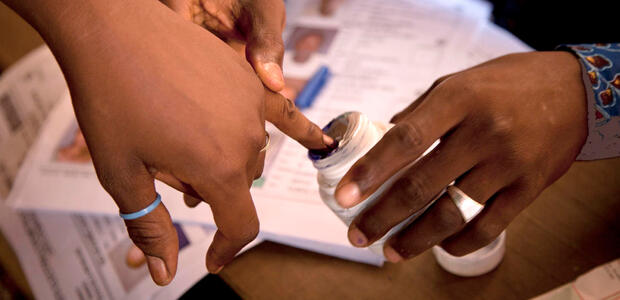Report
Effects of Swedish and international democracy aid
Democracy aid is a significant component of development cooperation. As a share of total aid, it has increased steadily since the mid-1990s. In 2018, countries in the OECD Development Assistance Committee (DAC) devoted roughly 10 per cent of overseas...
Blog
Foreign aid can help stem the decline of democracy, if used in the right way
by
Rachel M. Gisselquist, Miguel Niño-Zarazúa
April 2021
Democracy is having a hard time. In India, once the world’s largest democracy, the pandemic has hastened the country’s slide toward authoritarianism...
Book Chapter
Foreign aid and peacebuilding
Foreign aid is a core component of peacebuilding and among the largest external financial flows to fragile states and conflict-affected areas. Nevertheless, troubling critiques have been raised about its overall impact and effectiveness. Some of the...
Working Paper
Aid targeting to fragile and conflict-affected states and implications for aid effectiveness
While significant amounts of foreign aid have been allocated to the group of so-called fragile and conflict-affected states in recent years, it is not clear whether that aid is targeted to where it is most needed. This paper extends recent work by...
Working Paper
What does the evidence tell us about ‘thinking and working politically’ in development assistance?
This paper critically reviews evidence on ‘thinking and working politically’ in development. Scholars and practitioners have increasingly recognised that development is fundamentally political, and efforts are underway to develop more politically...
Working Paper
Institutional bypass and aid effectiveness in Africa
Many practical and action-oriented international roadmaps to improve the quality of aid and its delivery and impact on development—including the Paris Declaration, Accra Agenda for Action, and Busan Partnership—emphasize a more active involvement of...
Working Paper
Do countries use foreign aid to buy geopolitical influence?
In recent years, donor countries have increasingly used different aid allocation channels to boost aid effectiveness. One delivery channel that has grown tremendously is ‘multi-bi aid’—contributions to multilateral organizations earmarked for...
Working Paper
Too many cooks in the kitchen?
The total funding envelope for World Bank projects is often divided among various state and non-state actors, each of which can have competing ideas about or interests in the project. How does the division of financing relate to overall project...
Blog
The vital role of aid in development
by
Rachel M. Gisselquist,
Sam Jones
June 2019
The UNU-WIDER research programme on foreign aid (ReCom) began in 2010, in a period of strong aid scepticism. Dambisa Moyo’s well-known book, Dead Aid...
Blog
Why the Aid Effectiveness Principles are important for development
Demonstrating empirically the Aid Effectiveness Principles' global impact on development is a challenge. But according to Rachel M. Gisselquist...
Journal Article
Do the principles of effective development co-operation improve development outcomes?
Elaborated in their current form in Busan in 2011, and reiterated in Geneva in 2022, the four Principles of Effective Development Co-operation comprise country ownership, focus on results, inclusive partnerships, and transparency and mutual...
Blog
Development aid cuts will hit fragile countries hard, could fuel violent conflict
Fragile and least developed countries have had their development assistance cut drastically, according to the Organisation for Economic Co-operation...
Policy Brief
Aid effectiveness
The questions of whether aid has impact and is effective have been the subject of considerable attention. This thematic issue brings together nine studies that speak to the diverse ways in which aid affects development outcomes including, but not...
Presentation
Presentation to the Agence Française de Développement
Lead researchers from UNU-WIDER's Assessment of potential distributional impacts of four development programmes in Benin, Djibouti-Ethiopia, Uganda, and Viet Nam project present the research results to officials at the Agence Française de...
Thu, 14 September 2023
Agence Française de Développement, Headquarters,
5 rue Roland Barthes,
Paris,
France
Past event
Workshop
Report on aid and social protection systems in the Global South shared with Swedish development agency
Non-resident Senior Research Fellow at UNU-WIDER, Miguel Niño-Zarazúa, is invited to speak and share results at a half-day workshop on 'Social protection in the Global South: evidence, sustainability, climate change and migration, and the role of aid...
Thu, 21 September 2023
Sida, rm. Höga Kusten,
Sundbyberg, Rissneleden 10,
Stockholm,
Sweden
Past event
Panel discussion
Rachel Gisselquist at Finland's Development Policy Days 2021
Rachel M. Gisselquist joins a panel discussion at the annual Development Policy Days event hosted by the Ministry of Foreign Affairs, Finland. The event is held 9-10 November 2021 both online and at Finlandia Hall, Helsinki from 8:30 – 16:30. Rachel...
Tue, 9 November 2021
–
Wed, 10 November 2021
Helsinki,
Finland
Past event
Presentation
Miguel Nino-Zarazua and Rachel Gisselquist presenting to Finland's Development Policy Committee
Miguel Niño-Zarazúa, Non-Resident Senior Research Fellow at UNU-WIDER, and Rachel M. Gisselquist, Senior Research Fellow at UNU-WIDER are presenting to the Development Policy Committee of Finland on 2 September 2021 at 14:00 (UTC+3). The subject of...
Thu, 2 September 2021
Online,
Finland
Past event
Seminar
Aid effectiveness in fragile states
UNU-WIDER researchers offer a seminar on aid effectiveness in fragile states to an audience of Swedish development officials and foreign officers. The seminar is organized by the Swedish International Development Cooperation Agency (SIDA).
Tue, 23 May 2023
Online,
Sweden
Past event
Policy seminar
UNU-WIDER at the Effective development co-operation summit
Mon, 12 December 2022
–
Wed, 14 December 2022
Geneva,
Switzerland
Past event
Working Paper
Donor relations and sovereignty
As a sovereign country, Mozambique initially relied on international solidarity and managed its donor relations well. Donor dependency entailed some loss of agency for the government as it allowed donors to challenge its capacity but never its...
Working Paper
Does project-level aid for water and sanitation improve child health outcomes?
Empirical studies on the effectiveness of aid to the water, sanitation, and hygiene sector (WASH aid) have focused primarily on access to these services as the benchmark for evaluating the effectiveness of aid in this sector. Given the importance of...
Working Paper
Good for now but not forever: officials’ perspectives on the relevance of the effectiveness agenda and the need for change
This paper investigates whether the current effectiveness agenda—agreed during the 2011 Busan High Level Forum on Development Effectiveness—continues to define best practice in development amidst a rapidly changing development landscape. To do so, we...
Working Paper
Development narratives in a post-aid era
This paper argues that the crisis facing the development effectiveness agenda is fundamentally derived from limited collective commitment to a singular model of development, one where a developed North serves as model and funder for a developing...
Working Paper
Evidence on aid (in)effectiveness in highly fragile states
This working paper provides a summary of three systematic reviews on the effectiveness of aid in Afghanistan, Mali, and South Sudan between 2008 and 2021. These three countries, like all other highly fragile countries, suffer from bad governance...
Working Paper
Aid effectiveness in fragile and conflict-affected contexts
The objective of this paper is to focus on fragility research findings and examine what works or does not work in development aid and development cooperation in fragile and conflict-affected contexts. We draw on our own research findings as well as...
Policy Brief
Building evidence around the effectiveness principles
This policy brief draws on the studies presented at the International Research Conference on the Effectiveness of Development Cooperation on 17–18 November 2022, in Brussels, Belgium and jointly organized by UNU-WIDER and the European Commission (DG...
Working Paper
Does aid fragmentation affect tax revenue dynamics in developing countries?
There exists a burgeoning empirical literature on the impact of aid fragmentation on development outcomes in aid-receiving countries, with it being widely recognized that aid fragmentation is deleterious. This paper adds to the existing literature by...
Working Paper
Politics, policies, and the effectiveness of foreign aid in fragile states
International development cooperation has evolved since the 1960s. The effectiveness of aid is still topical, but studies have not paid adequate attention to the relationship between sectoral aid, politics, institutions, and aid effectiveness in...
Working Paper
Do the effectiveness principles matter for development?
The Principles of Effective Development Co-operation provide an important reference point for foreign aid and international development assistance. Although the principles—country ownership, focus on results, inclusive partnerships, and transparency...
Working Paper
The institutions and policies of aid-recipient countries and aid effectiveness
The aid effectiveness principles have limits if the recipient is fragile. The problem of relevance exists if the recipient has an authoritarian or totalitarian regime. In situations of weak statehood and fragility, a large portion of aid would likely...
News
Press release: New study shows democracy aid works
Does development cooperation aimed at strengthening democracy work? A new study from the Expert Group for Aid Studies (EBA) addresses critical knowledge gaps on aid assistance. The report, published today, is the most comprehensive study on democracy aid to date.
Presentation
Rachel M. Gisselquist and Miguel Niño-Zarazúa on Effectiveness of International & Swedish Democracy Aid for ICLD
On Tuesday, 16 February 2021 at 13:00 Stockholm time, Miguel Niño-Zarazúa, Non-Resident Senior Research Fellow at UNU-WIDER, and Rachel M. Gisselquist, Senior Research Fellow at UNU-WIDER will be presenting and discussing the findings of the report...
Tue, 16 February 2021
Online,
Stockholm,
Sweden
Past event
Presentation
Rachel M. Gisselquist and Miguel Niño-Zarazúa on Effectiveness of International & Swedish Democracy Aid for IFES
On Friday, 19 February 2021 at 08.30 EST, Miguel Niño-Zarazúa, Non-Resident Senior Research Fellow at UNU-WIDER, and Rachel M. Gisselquist, Senior Research Fellow at UNU-WIDER will be presenting and discussing the findings of the report Effects of...
Fri, 19 February 2021
Online,
United States
Past event
Presentation
Rachel M. Gisselquist and Miguel Niño-Zarazúa on Effectiveness of International & Swedish Democracy Aid for DEval
On Thursday, 11 March 2021 at 16:00 CET, Miguel Niño-Zarazúa, Non-Resident Senior Research Fellow at UNU-WIDER, and Rachel M. Gisselquist, Senior Research Fellow at UNU-WIDER will be presenting and discussing the findings of the report Effects of...
Thu, 11 March 2021
Online,
Bonn,
Germany
Past event
Working Paper
Putting Paris into practice
This paper examines the application of the first two principles of the 2005 Paris Declaration on Aid Effectiveness, namely ownership and alignment, to the cases of Mali and Ghana. It argues that Western donors and recipient governments have adopted...
Presentation
Is Development cooperation still relevant in Africa? Lessons from UNU-WIDER research on aid effectiveness
A presentation by Finn Tarp, Director of UNU-WIDER at the 'Annual Meeting of Finnish Heads of Mission: Interdependence will come to the fore in global political changes'. For more information see here. Presentation slides here
Fri, 22 August 2014
Ministry for Foreign Affairs,
Merikasarmi,
Helsinki,
Finland
Past event

 Join the network
Join the network









